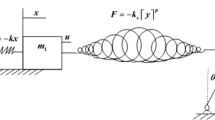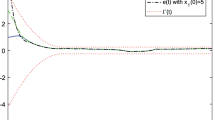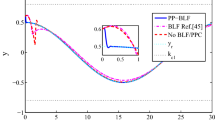Abstract
Low-complexity prescribed performance control (PPC) is a control methodology whose strongest feature is its structural simplicity, namely, uncertainty can be handled without unknown parameter estimators or approximation structures, e.g., fuzzy logic or neural networks, considered in the design of the control scheme. This work shows that low-complexity PPC can tackle uncertain high-order odd-rational power nonlinear dynamics, i.e., an integrator chain where the power is the ratio of odd integers. State of the art has shown the feasibility of PPC for strict-feedback nonlinear dynamics (an integrator chain with a power equal to one) or high-order odd-integer-power nonlinear dynamics. In this paper, we show that the same structural simplicity of PPC can be retained for the more general class of high-order odd-rational-power nonlinear systems. Note that all the methods proposed in the literature for handling high-order nonlinearities cannot be used with rational powers (unless restricting the system’s nonlinearity growth). Therefore, a new lemma is proposed to handle the odd-rational power scenario without restricting the nonlinearities’ growth. Interestingly, the developed scheme generalizes the most advanced PPC and effectively handles the input quantization, and unknown power problems studied recently.




Similar content being viewed by others
Data Availability
The datasets generated during the current study are available from the corresponding author on reasonable request.
References
Krstic, M., Kokotovic, P.V., Kanellakopoulos, I.: Nonlinear and Adaptive Control Design. John Wiley & Sons Inc., London (1995)
Zhang, X., Tan, J., Wu, J., Chen, W.: Event-triggered-based fixed-time adaptive neural fault-tolerant control for stochastic nonlinear systems under actuator and sensor faults. Nonlinear Dyn. 108, 2279–2296 (2022)
Qi, X., Xu, S., Li, Y., Chu, Y.: Global fixed-time event-triggered control for stochastic nonlinear systems with full state constraints. Nonlinear Dyn. 111, 7403–7415 (2023)
Ge, S.S., Hang, C.C., Lee, T.H., Zhang, T.: Stable Adaptive Neural Network Control, vol. 13. Springer, Berlin (2013)
Lv, M., Schutter, B.D., Baldi, S.: Non-recursive control for formation-containment of HFV swarms with dynamic event-triggered communication. IEEE Trans. Ind. Inform. (2022). https://doi.org/10.1109/TII.2022.3163573
Qi, R., Tao, G., Jiang, B.: Fuzzy System Identification and Adaptive Control. Springer, Berlin (2019)
Zhai, J., Wang, H., Tao, J., He, Z.: Observer-based adaptive fuzzy finite time control for non-strict feedback nonlinear systems with unmodeled dynamics and input delay. Nonlinear Dyn. 111, 1417–1440 (2023)
Wang, N., Wang, Y., Park, J.H., Lv, M., Zhang, F.: Fuzzy adaptive finite-time consensus tracking control of high-order nonlinear multi-agent networks with dead zone. Nonlinear Dyn. 106, 3363–3378 (2021)
Bai, W., Liu, P.X., Wang, H.: Fixed-time adaptive fuzzy control for nonlinear interconnection high-order systems with unknown control direction. Nonlinear Dyn. (2023). https://doi.org/10.1007/s11071-023-08724-z
Theodorakopoulos, A., Rovithakis, G.A.: Guaranteeing preselected tracking quality for uncertain strict-feedback systems with deadzone input nonlinearity and disturbances via low-complexity control. Automatica 54, 135–145 (2015)
Bechlioulis, C.P., Rovithakis, G.A.: Robust partial-state feedback prescribed performance control of cascade systems with unknown nonlinearities. IEEE Trans. Autom. Control 56(9), 2224–2230 (2011)
Bechlioulis, C.P., Rovithakis, G.A.: A low-complexity global approximation-free control scheme with prescribed performance for unknown pure feedback systems. Automatica 50(4), 1217–1226 (2014)
Choi, Y.H., Yoo, S.J.: Robust event-driven tracking control with preassigned performance for uncertain input-quantized nonlinear pure-feedback systems. J. Frankl. Inst. 355(8), 3567–3582 (2018)
Ding, J., Zhang, W.: Prescribed performance tracking control for high-order uncertain nonlinear systems. Nonlinear Dyn. (2023). https://doi.org/10.1007/s11071-023-08604-6
Zhang, J.X., Yang, G.H.: Low-complexity tracking control of strict-feedback systems with unknown control directions. IEEE Trans. Autom. Control 64(12), 5175–5182 (2019)
Bikas, L.N., Rovithakis, G.A.: Combining prescribed tracking performance and controller simplicity for a class of uncertain MIMO nonlinear systems with input quantization. IEEE Trans. Autom. Control 64(3), 1228–1235 (2019)
Theodorakopoulos, A., Rovithakis, G.A.: Low-complexity prescribed performance control of uncertain MIMO feedback linearizable systems. IEEE Trans. Autom. Control 61(7), 1946–1952 (2015)
Liu, Y.H., Li, H.: Adaptive asymptotic tracking using barrier functions. Automatica 98, 239–246 (2018)
Lin, W., Pongvuthithum, R.: Adaptive output tracking of inherently nonlinear systems with nonlinear parameterization. IEEE Trans. Autom. Control 48(10), 1737–1749 (2003)
Lin, W., Qian, C.: Adding one power integrator: a tool for global stabilization of high-order lower-triangular systems. Syst. Control Lett. 39(5), 339–351 (2000)
Lv, M., Yu, W., Cao, J., Baldi, S.: Consensus in high-power multi-agent systems with mixed unknown control directions via hybrid nussbaum-based control. IEEE Trans. Cybern. (2020). https://doi.org/10.1109/TCYB.2020.3028171
Lv, M., Wang, N.: Distributed control for uncertain multi-agent systems with the powers of positive-odd numbers: a low-complexity design approach. IEEE Trans. Autom. Control (2023). https://doi.org/10.1109/TAC.2023.3266986
Sun, Z.Y., Li, T., Yang, S.H.: A unified time-varying feedback approach and its applications in adaptive stabilization of high-order uncertain nonlinear systems. Automatica 70, 249–257 (2016)
Sun, Z.Y., Zhang, C.H., Wang, Z.: Adaptive disturbance attenuation for generalized high-order uncertain nonlinear systems. Automatica 80, 102–109 (2017)
Wang, N., Wen, G., Wang, Y., Zhang, F., Zemouche, A.: Fuzzy adaptive cooperative consensus tracking of high-order nonlinear multiagent networks with guaranteed performances. IEEE Trans. Cybern. 52(9), 8838–8850 (2021)
Sun, Z.Y., Shao, Y., Chen, C.C.: Fast finite-time stability and its application in adaptive control of high-order nonlinear system. Automatica 106, 339–348 (2019)
Sun, Z.Y., Xue, L.R., Zhang, K.: A new approach to finite-time adaptive stabilization of high-order uncertain nonlinear system. Automatica 58, 60–66 (2015)
Yu, W., Li, Y., Wen, G., Yu, X., Cao, J.: Observer design for tracking consensus in second-order multi-agent systems: fractional order less than two. IEEE Trans. Autom. Control 62(2), 894–900 (2016)
Wang, N., Wang, Y., Wen, G., Lv, M., Zhang, F.: Fuzzy adaptive constrained consensus tracking of high-order multi-agent networks: a new event-triggered mechanism. IEEE Trans. Syst. Man Cybern. Syst. 52(9), 5468–5480 (2021)
Yoo, S.J.: Simplified global fault accommodation control design of uncertain nonlinear systems with unknown time-varying powers. Nonlinear Dyn. 99(2), 1115–1128 (2020)
Man, Y., Liu, Y.: Global adaptive stabilization and practical tracking for nonlinear systems with unknown powers. Automatica 100, 171–181 (2019)
Yoo, S.J., Kim, T.H.: Decentralized low-complexity tracking of uncertain interconnected high-order nonlinear systems with unknown high powers. J. Frankl. Inst. 355(11), 4515–4532 (2018)
Yoo, S.J.: A robust low-complexity tracker design with preassigned performance for uncertain high-order nonlinear systems with unknown time-varying delays and high powers. J. Frankl. Inst. 355(2), 675–692 (2018)
Lai, G., Liu, Z., Chen, C.P., Zhang, Y.: Adaptive asymptotic tracking control of uncertain nonlinear system with input quantization. Syst. Control Lett. 96, 23–29 (2016)
Zhou, J., Wen, C., Yang, G.: Adaptive backstepping stabilization of nonlinear uncertain systems with quantized input signal. IEEE Trans. Autom. Control 59(2), 460–464 (2013)
Gao, S., Dong, H., Ning, B.: Neural adaptive dynamic surface control for uncertain strict-feedback nonlinear systems with nonlinear output and virtual feedback errors. Nonlinear Dyn. 90(4), 2851–2867 (2017)
Sontag, E.D.: Mathematical Control Theory: Deterministic Finite Dimensional Systems, vol. 6. Springer, Berlin (2013)
Manring, N.D., Fales, R.C.: Hydraulic Control Systems. Wiley, New York (2020)
Abramowitz, M., Stegun, I.A.: Handbook of mathematical functions with formulas, graphs, and mathematical tables. In: Appl (1972)
Acknowledgements
This research was supported by the Young Talent Support Project for Military Science and Technology under Grant 2022-JCJQ-QT-018, Young Talent Fund of Association for Science and Technology in Shaaxi under Grant 20220101, and Postdoctoral International Exchange Program Introduction Project under Grant YJ20220347.
Funding
The authors have not disclosed any funding.
Author information
Authors and Affiliations
Corresponding author
Ethics declarations
Conflict of interest
The authors declare that they have no conflict of interest.
Additional information
Publisher's Note
Springer Nature remains neutral with regard to jurisdictional claims in published maps and institutional affiliations.
Appendix
Appendix
Proof of Lemma 5
The goal is to find an upper and lower bound in the form
for some appropriately bounded functions \(\underline{\mu }(\cdot ,\cdot )\), \(\underline{\vartheta }(\cdot ,\cdot )\), \(\bar{\mu }(\cdot ,\cdot )\), and \(\bar{\vartheta }(\cdot ,\cdot )\). By employing the binomial theorem [39, Sect. 3.1, p. 10], an upper bound can be derived for \(\forall x_1\), \( x_2\in {\mathbb {R}}\):
where the second inequality relies on Lemma 4, \(\varepsilon _k=\frac{k}{p}\varepsilon ^{\frac{p}{k}}\), \(\omega _k=\frac{p-k}{p}\left( \begin{array}{c} p \\ k \\ \end{array}\right) \varepsilon ^{\frac{-p}{p-k}}\), \(\omega =\sum _{k=1}^{p-1}\omega _k\), and \(\bar{\epsilon }=\sum _{k=1}^{p-1}\varepsilon _k\) satisfies \(0<\bar{\epsilon }<1\) by appropriately selecting the small positive constant \(\varepsilon \).
A lower bound will be sought along the following three situations.
Situation 1: When \(x_1<0\) and \(x_1+x_2\ge 0\), we immediately have \((x_1+x_2)^p\ge 0\ge x_1^p\) as p is a positive odd integer.
Situation 2: When \(x_1<0\) and \(x_1+x_2<0\), it follows that
which indicates that \((x_1+x_2)^p\ge 2^{p-1}x_1^p+2^{p-1}x_2^p\).
Situation 3: When \(x_1\ge 0\) and \(x_2\in {\mathbb {R}}\), then following similar derivations to (49), it holds that \((x_1-x_2)^p=\big [x_1+(-x_2)\big ]^p\le \big [1+\bar{\epsilon }\cdot \textrm{sign}(x_1)\big ]x_1^p -\big [1-\omega \cdot \textrm{sign}(x_2)\big ]x_2^p.\) Besides, note that \((x_1+x_2)^p+(x_1-x_2)^p=2\Big [x_1^p+\sum _{k=1}^{\frac{p-1}{2}} \left( \begin{array}{c} p \\ 2k-1 \\ \end{array}\right) \overbrace{x_1^{2k-1}}^{\ge 0} \overbrace{x_2^{p-2k+1}}^{\ge 0}\Big ]\ge 2x_1^2\). Thus, we have \((x_1+x_2)^p\ge [1-\bar{\epsilon }\cdot \textrm{sign}(x_1)]x_1^p+[1+\omega \cdot \textrm{sign}(x_2)]x_2^p\).
Having derived all the necessary upper and lower bounds in the form of (48), we conclude that the equality \(\big [x_1^p\vartheta (x_1,x_2)+x_2^p\mu (x_1,x_2)\big ]^{\frac{1}{q}}= (x_1+x_2)^{\frac{p}{q}}\) holds for any \(x_1\), \(x_2\), for some function \(\vartheta (\cdot ,\cdot )\subset \big [1-\bar{\epsilon }, \max \{1+\bar{\epsilon }, 2^{p-1}\}\big ]\) with \(\bar{\epsilon }\in (0,1)\) and \(|\mu (\cdot ,\cdot )|\le \bar{\upsilon }\) with \(\bar{\upsilon }>0\) being independent of \(x_1\) and \(x_2\). This completes the proof. \(\square \)
Rights and permissions
Springer Nature or its licensor (e.g. a society or other partner) holds exclusive rights to this article under a publishing agreement with the author(s) or other rightsholder(s); author self-archiving of the accepted manuscript version of this article is solely governed by the terms of such publishing agreement and applicable law.
About this article
Cite this article
Yue, L., Lv, M., Cao, J. et al. Low-complexity prescribed performance tracking control for uncertain high-order nonlinear systems considering input quantization. Nonlinear Dyn 111, 19979–19991 (2023). https://doi.org/10.1007/s11071-023-08886-w
Received:
Accepted:
Published:
Issue Date:
DOI: https://doi.org/10.1007/s11071-023-08886-w




